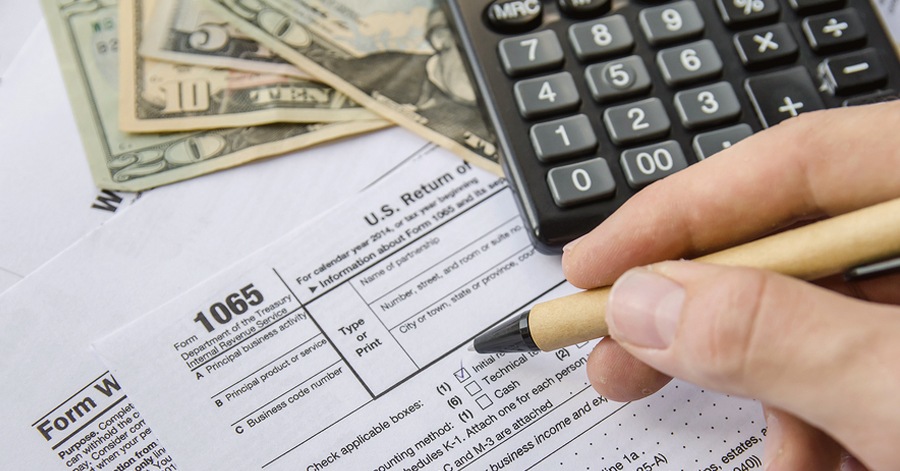Although no one likes taxes, a partnership tax return checklist can help simplify and expedite your tax returns. The IRS defines a partnership as a “relationship existing between two or more persons who join to carry on a trade or business.”
People often join partnerships, instead of venture out alone because it allows for greater resources, skills-balancing, innovation, and helps to reduce individual costs. However, the actual partnership itself doesn't pay federal income tax.
Instead, the losses, income, credits, and deductions are passed through to the business owners, who report these amounts as a part of their income tax returns. Continue reading to learn more about a simple 5 step partnership tax return checklist that should simplify and expedite your tax returns.
Simple 5-Step Partnership Tax Return Checklist
While partnerships may not be taxed, each partnership must file a tax return every year unless the business has no expenses or income. Whether you operate as a limited partnership or as a general partnership, use the following five steps in the partnership tax return checklist to help you complete your return:
- Complete the U.S. Return of Partnership Income - Form 1065
- Prepare Schedule K-1
- File copies of the K-1 and Form 1065
- File your state tax returns
- Complete and file your personal tax returns
Important Forms in Your Partnership Tax Return Checklist
In the process of filing your partnership taxes, you'll most likely need to fill out Form 1065, Form 941, and Form K-1.
Form 1065
This form is used to report the gains, deductions, credits, and income resulting from a partnership. While you claim these items as part of your yearly income, you must file this form for verification purposes. To fill out this form properly, you need:
- An income statement
- A comprehensive balance sheet
- A list of current and future expenses
- General Information about the partnership
(business code, date of launch, and Employer ID number) - An understanding of your business’ accounting practices
- The final value of all goods sold
- A list of current inventories
Form 941 - Employer's Quarterly Federal Tax Return
You may need to use this form to report social security tax, income taxes, or Medicare tax withheld from your employees' paychecks. You need to know the following to file it:
- Amount paid to inventory in tips and wages
- The total cost of Medicare and social security taxes
- How many special tax credits you can claim
Schedule K-1
Each partner is responsible for filing their own individual tax return to report their share of losses, income, deductions, and credits reported on 1065 tax form. Then, the partnership should prepare a Schedule K-1 to report each partner's share of the returns. It lists:
- The ownership percentage of each partner
- The partner’s share of business income or loss
- Contact information for each partner
The Two Requirements of a Partnership Tax Return Checklist
Few truer statements exist then this one: “People don’t like taxes.” They’re confusing, they can sometimes feel like a rip off, and filing them incorrectly can land you in jail; just ask Al Capone. And, unsurprisingly, the added complexities of partnerships do little to generate that warm-fuzzy feeling. When it comes to filing taxes as a business partner, here are some quick facts:
- Income, gains, losses, and deductions from the business pass through to the business partners. This means that the government counts these items as part of your annual income, instead of a business asset.
- Unless specified, taxes for the business are spread out according to each partner’s individual stake. Therefore, if you own 60% of the business, you’re responsible for the taxes equivalent to that amount.
- The government taxes profits as income, regardless of if you receive them. Even if you put all the money back into the business, this rule still applies.
- Both partners can deduct business expenses from their income. This fact will help stop the IRS from gobbling up all of your business taxes. You can deduct the following: start-up costs, travel costs, marketing costs, operating costs, and other business-related costs.
- Partners should not receive W-2s. You are not considered true employees of your business; therefore, you should not be treated like one.
Contact John F. Dennehy Jr. CPA for Partnership Tax Filing
While taxes are not the insurmountable beast we make them out to be, they truly are sources of great confusion. Adding an entrepreneurial spirit and a seemingly endless list of day-to-day business management tasks to the pile does little to lighten the load.
Fortunately, you don't have to do it alone! The experts at John F. Dennehy Jr. CPA, PC offer decades of experience helping partners save time and money with:
Let's talk more about what we can do help your partnership run more effectively. Contact John F. Dennehy Jr. CPA today.





